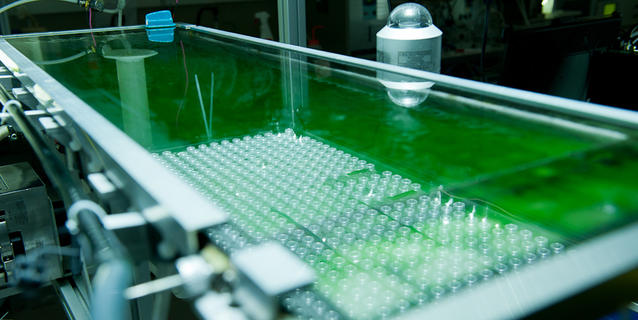 |
|
|
|
|
Solar Energy Aims for the Sky
|
|
12.09.2015 |
|
Energy
Capturing solar energy with balloons floating above the clouds for uninterrupted energy production. This idea, developed by the electro-chemist Jean-François Guillemoles may not be that far-fetched.
|
|
Read the opinion
|
|
|
|
|
 |
|
|
|
|
Do Black Holes Distort Time?
|
|
01.11.2016 |
|
astrophysics
A century after Einstein published his theory of general relativity, one of its most disturbing predictions remains intriguing: to what extent does the proximity of massive bodies such as planets, stars and black holes slow down time?
|
|
Read the article
|
|
|
|
|
 |
|
|
|
|
2015: A Year in Science
|
|
12.29.2015 |
|
Research
From the discovery of new particles to the development of a promising treatment against lupus, or the unprecedented mobilization of climatologists for the COP21, French research was in 2015 marked by important events and numerous scientific achievements. Here is a look back at some of the stories we covered.
|
|
Access the slideshow
|
|
|
|
|
|
Also this month
|
 |
|
|
|
Eric Karsenti, Explorer of the Living World
|
|
12.14.2015 |
|
Multimedia Eric Karsenti was awarded the 2015 CNRS Gold Medal, France's highest scientific distinction. Discover the interactive profile of this biologist, a pioneer in cell cycle regulation research and the instigator of the Tara Oceans expedition. |
|
View infographics
|
|
|
|
 |
|
|
|
Europe’s Rising Stars
|
|
12.17.2015 |
|
Research Measuring the impact of an ice-free Arctic on the natural environment; creating the world’s first molecule-sized microchip; and granting easy access to the entire database of astronomical observations: led by CNRS researchers, these three completed projects were just commended at the annual Stars... |
|
Read the article
|
|
|
|
 |
|
|
|
Using History to Heal
|
|
01.05.2016 |
|
History What if we could improve diagnosis and treatment of a disease by revisiting how our understanding of it—or lack of—evolved over time? This strategy is at the heart of the SILICOSIS project, which by combining medicine and history has already improved the monitoring of patients exposed to specific... |
|
Read the article
|
|
|
|
|
|
 |
|
|
|
Capturing the Sun in a Cell
|
|
01.07.2016 |
|
Energy The photovoltaic industry has secured its role as a major contender in energy transition, whose economic and social stakes are now higher than ever. Researchers from the Lyon-based Institute of nanotechnology (INL) are developing innovative technologies to both increase efficiency and reduce the... |
|
Access the slideshow
|
|
|
|
 |
|
|
|
An Immortal Worm that Kills Bacteria
|
|
12.18.2015
|
|
immunology By studying an aquatic flatworm (planarian), well known for its extraordinary regenerative abilities, researchers in Marseille identified a gene capable of destroying tuberculosis and Staphylococcus aureus bacteria. Called Morn 2, this very active gene in the planarian is present in... |
|
Watch the video
|
|
|
|
 |
|
|
|
An Eagle’s Nest for Science
|
|
12.23.2015 |
|
climatology On Réunion island, the Maïdo Observatory has been monitoring the atmosphere since 2013. Using lidars, it can analyze its composition in gas and particles, gathering precious data in the context of climate change. |
|
Access the slideshow
|
|
|
|
|
|
 |
|
|
|
Biotech's Green Gold?
|
|
11.30.2015
|
|
bioengineering Microalgae can produce food, fuel and capture carbon dioxide in the process. These tiny organisms seem to meet many of humanity's development challenges. Yet scaling up the technology from a lab environment to industrial capacity is no easy task. The AlgoSolis research platform, inaugurated this... |
|
Watch the video
|
|
|
|
 |
|
|
|
Could the Future of Democracy be Digital?
|
|
12.04.2015 |
|
Computer science For all elections, Estonians can now choose between conventional or e-voting. In 2013, 21% of the electorate voted online. So why do other European countries—including France—whose elections are plagued by record abstention rates trail behind? |
|
Read the article
|
|
|
|